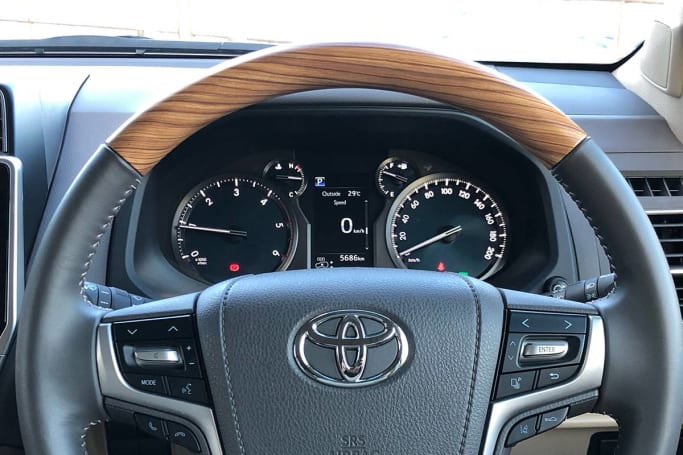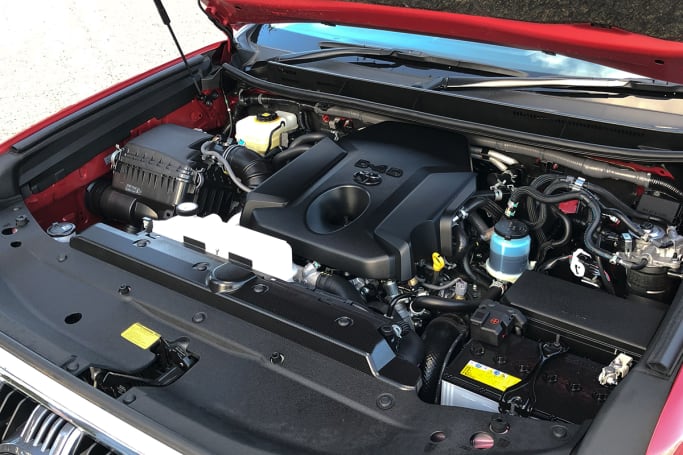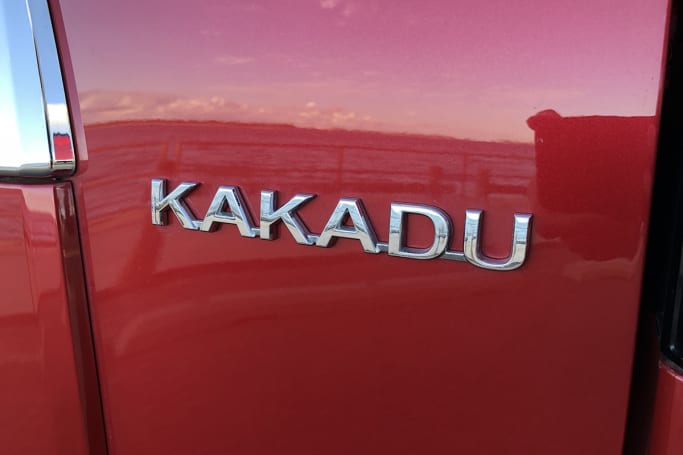
Ford Everest 2019 review
Change is good but there will always be some who become enraged at the mere hint of it. Case in point: those who strongly dislike 2.0-litre twin-turbo diesel engines.
Browse over 9,000 car reviews

Few nameplates can get away with being separated from their maker's mark. Testarossa. Mustang. Beetle. All iconic, all get away with being separated from their maker because they're a global brand in their own right.
The LandCruiser is one of these names that lives quite happily with or without the word Toyota accompanying it.
Everyone knows it's a Toyota, so there's no need for it. Even 'Defender' needs 'Land Rover' to go with it.
The Prado sub-brand has also done very nicely, thank you very much, making up one third of Toyota's large SUV segment domination and establishing itself as another strong name.
The Kakadu is the pinnacle of the Prado range and sir or madam has a choice of spare tyre on the rear tailgate or can choose the 'flat' tailgate option where the wheel is slung under the boot. Does that make a difference? It just might..
| Toyota Landcruiser Prado 2018: GXL (4X4) | |
|---|---|
| Safety rating | |
| Engine Type | 2.8L turbo |
| Fuel Type | Diesel |
| Fuel Efficiency | 8L/100km |
| Seating | 7 seats |
| Price from | $62,370 |
Laying out $84,490 for a Toyota isn't so much a leap of faith rather a monetary exchange for an enormous of car and gear.
It's a lot of money, but most people won't be disappointed. Your Kakadu will arrive with 18-inch alloys, a 14-speaker stereo, three-zone climate control, a decent safety package, reversing camera, around-view camera, keyless entry and start, active cruise control (including off-road mode), electric heated and cooled front seats, sat nav, auto headlights and wipers, auto LED headlights, leather seats, electric sunroof, rear DVD player, power everything, auto wipers, air suspension and some wood trim. A full-size alloy spare is a welcome rarity.
The 8.0-inch touchscreen is the usual tragic Toyota misstep - devoid of Apple CarPlay and Android Auto, it's a complete debacle. It's hard to use, a nightmare to learn and the DAB interface is truly appalling, negating the delight of its inclusion.
The 14 JBL-branded speakers, however, do a good job and the fold-down DVD/Blu-ray screen in the back is a nice retro touch even if when we activated it the speakers starting blasting The Wiggles.
When our 16 year-old son was little they made him cry and it turns out nothing much has changed.
As far as an office block on wheels goes, the Prado is reasonably handsome following a recent facelift.
Infiniti certainly threw the Prado into sharp relief with its borderline criminal QX90, making the 'baby' Cruiser's slab-sided/busy-fronted design look like catwalk material.
It isn't, but doing cars this big and making them pretty is hard and, as Range Rover will tell you, really expensive.

The Kakadu doesn't really try and sell off-road ruggedness. Yeah, it's got big balloon tyres and side steps you can actually use, but with the flat tailgate pack, it's a little more city-focussed.
The Kakadu's cabin is appropriately leather and carpet-lined, with electrically-operated third row seats.
You wouldn't call the design even slightly avant-garde and the fake wood on the steering wheel isn't as objectionable as I usually find (but I'd still prefer it wasn't there).
The central dash section is a bit of a cliff face, however, so it does feel a mite dated.
The Prado's seven seats are unusually roomy for all occupants. No, the third row isn't some time-space event that will seat two adults comfortably but nor is it cruel and unusual punishment that even the CIA wouldn't inflict.
The middle row of seats also slides forward and back (and is split 60/40) so you can better tune the space available.
There are air-conditioning vents everywhere ensuring the cabin quickly fills with reliably cold (or warm) air and it seems Oprah had a hand in deciding the number (as in, everybody gets one).
Speaking of cold, the deep central console bin is refrigerated at the touch of a button, there are cupholders in all three rows for a total of six and four bottle holders, one in each door.
Boot space is accessible either by the side-hinged tailgate opening wide or through a nifty glass hatch that comes when you tick the flat tailgate option.
That's especially helpful in car parks where you may not want to block traffic by swinging open the door.
You start with 120 litres with all seats in play, moving up to 480 litres with the rear seats folded down (the five-seat version has a whopping 640 litres, if you're interested).
One imagines with both rear rows folded down you'd get somewhere north of 1200 litres. That's a lot.
It's worth pointing out that the Prado is a nightmare to park - while the Kakadu is bristling with aids, you've got to watch for low-hanging pipes. And when you're almost two metres wide, not many car spaces will take you comfortably.
All Prados ship with a 2.8-litre four-cylinder turbo-diesel. When you don't choose the manual (and you can't in the Kakadu), you get a six-speed automatic driving all four wheels.
Power comes in at 130kW and 450Nm which is...well, the power is a bit on the weak side for 2.2 tonnes of LandCruiser. Even the Holden Trailblazer outguns the Prado with 147kW/500Nm.

The rear and centre diffs are manually lockable from the dash and you can force a burn-off from the diesel particulate filter if you're that way inclined.
Towing capacity is an impressive 3000kg braked (750kg unbraked).
Toyota tells me you'll score around 8.0L/100km on the combined cycle which I find very hard to believe.
Actually, I don't, because I had it for a week and found I could only coax 11.1L/100km out of it. However, my esteemed colleagues have done better, so perhaps conditions weren't right (it was stinking hot the week I had it).
The flat-tailgated Prado makes do with an 87-litre fuel tank where the others have a sub-tank with another 67 litres for a total of 150.
The Prado has seven airbags, ABS, stability and traction controls, reversing camera, front and rear parking sensors, trailer sway control, forward AEB, blind spot monitoring and reverse cross traffic alert.
There are three top-tether points in the middle row along with two ISOFIX points while the third row also features top tether anchorages.
The last ANCAP crash test for the Prado was way back in 2010 when it scored a maximum five stars.
Basic Warranty
3 years / 100,000 km warranty
ANCAP Safety Rating

Pop the champagne corks, folks - Toyota has joined the five year warranty brigade, with unlimited kilometres to boot, which is nice. An engine and driveline warranty extends to seven years.
Sadly, you have to buy roadside assistance, but you can buy it for up to six years.

Toyota's three-year/60,000km capped price servicing reigme applies, with each service costing $240.
That seems like a good deal until you realise that you have to visit the dealer every six months or 10,000km, which makes it $440 year.
Sigh. Let's get the bad bits out of the way. The Prado is very, very slow. While 450Nm of torque isn't small, it isn't huge, either.
The Prado needs big torque to move its 2240kg kerb weight. It moves, just not very quickly.
That probably translates very nicely when you're splashing about in the mud or crawling over rocks in low-range (Toyota's old-school selectable 4H and 4L modes remain), but on the road, you need to plan almost every move.
The vague, slow, but still hydraulic steering is pretty ordinary on tarmac, too, but you just know that it will work very nicely off-road.
The off-road purist will bemoan the Prado's lack of live axles front or rear, but given the Kakadu is clearly aimed at urban buyers, that's probably not a big deal.
Front suspension is by double-wishbones and the rear a four-link arrangement with air springs.
The ride is a bit fidgety in the back and my colleague Matt Campbell recently wrote that it's restricted to the Kakadu's trick rear suspension. He also said that if you are planning on off-roading, it will redeem itself.
Some of that redemption comes from being able to lift the rear to improve departure angles and clear obstacles. In the interests of completeness, the front approach angle is 30.4 degrees and the departure 23.5, with a 21.1-degree breakover angle. You're welcome.
The good stuff is good. While the engine may not excite, nor will it upset. It's quiet (dual balancer shafts help here) and the transmission is very smooth, so you won't be jolting about.
The ride for front seat passengers is bordering on pillowy, with the requisite - and understandable - body roll.
Here in the Kakadu that roll is reined in a little by the adaptive dampers, which firm up when you're in the rampantly optimistic Sport mode.
If you're looking for a hardcore off-road version of the Prado, the flat-tailgate Kakadu isn't for you. It's very much aimed at the suburban set but will do just fine if you do decide to get grotty.
It won't go as far with its much smaller fuel capacity and its equipment list is skewed towards comfort rather than mud-plugging. So maybe scale the lower part of the range.
However, if you're after a fully-loaded, almost stylish, very capable off-roader that acquits itself well enough around town, only a Range Rover will do better. And it'll cost you a heck of a lot more.
| Vehicle | Specs | Price* | |
|---|---|---|---|
| GX 7 Seat (4X4) | 2.8L, Diesel, 6 SP AUTO | $55,110 – 63,360 | 2018 Toyota Land Cruiser Prado 2018 GX 7 Seat (4X4) Pricing and Specs |
| GX (4X4) | 2.8L, Diesel, 6 SP AUTO | $57,640 – 66,220 | 2018 Toyota Land Cruiser Prado 2018 GX (4X4) Pricing and Specs |
| GXL (4X4) | 2.8L, Diesel, 6 SP MAN | $55,990 – 64,350 | 2018 Toyota Land Cruiser Prado 2018 GXL (4X4) Pricing and Specs |
| Kakadu (4X4) | 2.8L, Diesel, 6 SP AUTO | $95,370 – 109,670 | 2018 Toyota Land Cruiser Prado 2018 Kakadu (4X4) Pricing and Specs |
| Price and features | 8 |
|---|---|
| Design | 7 |
| Practicality | 9 |
| Under the bonnet | 7 |
| Efficiency | 7 |
| Safety | 7 |
| Ownership | 8 |
| Driving | 7 |
$29,500
Lowest price, based on 376 car listings in the last 6 months